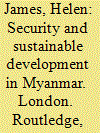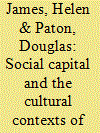| Srl | Item |
| 1 |
ID:
096022


|
|
|
|
|
| Publication |
2010.
|
| Summary/Abstract |
This article examines the economics-politics nexus in Thailand and Myanmar in the context of rent-seeking, revenues from oil and gas resources, and possible political reform.
|
|
|
|
|
|
|
|
|
|
|
|
|
|
|
|
| 2 |
ID:
074377


|
|
|
|
|
| Publication |
London, Routledge, 2006.
|
| Description |
xvi, 231p.
|
| Standard Number |
0415355599
|
|
|
|
|
|
|
|
|
|
|
|
Copies: C:1/I:0,R:0,Q:0
Circulation
| Accession# | Call# | Current Location | Status | Policy | Location |
| 051785 | 338.959107/JAM 051785 | Main | On Shelf | General | |
|
|
|
|
| 3 |
ID:
139222


|
|
|
|
|
| Summary/Abstract |
Social capital and leadership are critical in mobilizing collective actions to promote community and individual recovery after a natural disaster. Transformation to a better situation post-disaster, not just returning to a previous state, reflects the growing emphasis on disaster as a catalyst for change. To facilitate transformative change, the development focus at the core of this approach emphasizes empowerment through local governments and domestic civil society organizations working in the ‘bottom up’ participatory mode to enhance the resilience of vulnerable population groups. Poverty reduction and disaster risk reduction are interlinked. However, the research literature on disasters pays least attention to socially created vulnerabilities. They are ignored because of the difficulty in developing agreement on theory, and prioritizing issues quantifying them. This article investigates the impact of the cultural contexts in Myanmar and Taiwan on disaster recovery and reconstruction plans for specific disaster events in which vulnerable population groups respond to different risk governance frameworks and suggests a foundation for developing a cross-cultural, all-hazards approach to understanding the relationship between resilience and recovery in the context of large-scale Asian disasters.
|
|
|
|
|
|
|
|
|
|
|
|
|
|
|
|